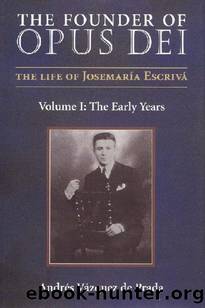The Founder of Opus Dei: Volume I, The Early Years (The Life of Josemaria Escriva) by De Prada Andres Vazquez

Author:De Prada, Andres Vazquez [Vazquez, De Prada, Andres]
Language: eng
Format: epub
Publisher: Scepter Publishers
Published: 2011-04-18T04:00:00+00:00
6
Personal Notes
1. Why âWork of Godâ?
The Escrivás had been living in the apartment on Fernando el Católico Street for less than two years when, in September 1929, Doña Dolores and her children had to move to José Marañón Street. Their new home was an annex to the Foundation for the Sick with a separate entrance from the street. They made the move not out of a desire to improve their living conditions, but simply because the apartment came with the chaplaincy. For one person it would have been comfortable, but for a family it was very cramped. Still, it did have the advantage of being directly connected with the main building, so that the chaplain could enter the church without having to go outside.1
Doña Dolores may have seen her priest-son more often now, but then again she may not, considering how busy he was. Besides his duties as chaplain and his treks through the poorer neighborhoods of Madrid to visit the sick and the poor, new tasks were also piling up. He had to maintain his mother and siblings in a dignified fashion, and he had to complete his studies for the doctorate in lawâhis reason for coming to Madrid. A person with less spirit and optimism than Father JosemarÃa would have had the disheartening sense of being trapped in a net of commitments that tightened every day.
What money he had came from his chaplainâs pay (insufficient for the needs of a family), his income from the Cicuéndez Academy, and whatever he could make giving private lessons.2 It did not add up to enough to raise his family out of the poverty they had been bearing, albeit nobly, since their years in Logroño. Many schemes for improving their lot occurred to him, but these were passing fancies that quickly left his mind, displaced by the demanding, inescapable mission of giving birth to the Work.3
Given the pressure of that divine mission and the instability of his family situation, something had to give; and that something was his legal studies. Father JosemarÃa did what he could under the circumstances. On December 15, 1929, he submitted to the dean of the law school a formal request for permission to take two examinations in the January 1930 session: History of Juridical Literature and Social Politics. But, as usual, his desires exceeded his possibilities. He was able to take only the History of Juridical Literature exam, and in it he obtained only the middling grade of âNotable.â 4
Now he began to look for an appropriate research topic for his doctoral dissertation. On March 7, 1930, he wrote to Father Pou de Foxá, in Saragossa, asking his advice:
You must have already received, several days ago, a long letter from me. Well, today I am writing to send you the sheets on which I copied down the list of canon law papers which the National Library has in its manuscript section, to see if you can help me find a way I could use one or another
Download
This site does not store any files on its server. We only index and link to content provided by other sites. Please contact the content providers to delete copyright contents if any and email us, we'll remove relevant links or contents immediately.
Einstein: His Life and Universe by Walter Isaacson(1330)
Finding Freedom: Harry and Meghan and the Making of a Modern Royal Family by Omid Scobie & Carolyn Durand(1186)
Promised Land (9781524763183) by Obama Barack(1160)
Compromised by Peter Strzok(1075)
Finding Freedom by Omid Scobie(1066)
JFK by Fredrik Logevall(1007)
Freedom by Sebastian Junger(646)
Salford Lads: The Rise and Fall of Paul Massey by Bernard O'Mahoney(592)
The Russia House by John Le Carré(571)
Kremlin Winter by Robert Service(535)
Day of the Dead by Mark Roberts(521)
Graveyard (Ed & Lorraine Warren Book 1) by Ed Warren & Lorraine Warren & Robert David Chase(514)
A World Ablaze by Craig Harline(512)
Flying Tiger by Samson Jack(509)
Joe Biden: American Dreamer by Evan Osnos(499)
Melania and Me: The Rise and Fall of My Friendship With the First Lady by Stephanie Winston Wolkoff(482)
100 Things Successful Leaders Do by Nigel Cumberland(481)
The Irish Buddhist by Alicia Turner(480)
The Mission by David W. Brown(465)
